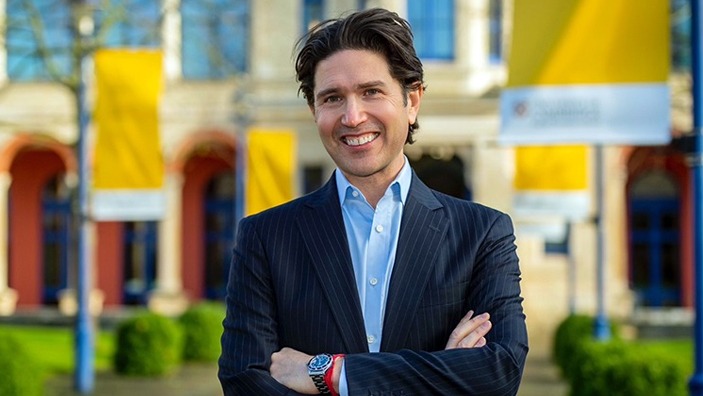Following 2 decades on the East Coast of the US, including stops in Boston and New York, Professor Christopher Marquis moved to Cambridge Judge Business School in part because of what he perceived as greater social and environmental consciousness in the UK and EU. He has not been disappointed.
“There is more attention to urgent societal and environmental issues and a vibrant movement for business sustainability this side of the Atlantic, and I’m glad to be part of that here in Cambridge,” says Christopher, who published a book in 2020 about the rise of the B Corp movement (“Better Business: How the B Corp Movement is Remaking Capitalism”), which is a key player in these trends. B Corps are companies whose social and environmental performance has been verified by the global non-profit certifying body B Lab.
How the B Corp movement gained momentum worldwide after beginning in the US

“In the UK alone there are more than 1,500 companies that have received B Corp certification, which is second only to the United States where the movement started,” says Christopher, Sinyi Professor of Chinese Management at Cambridge Judge Business School.
“Given how Cambridge Judge Business School sits at the heart of the broader Cambridge climate and sustainability ecosystem and the various disciplines of the University of Cambridge, this is a great place to look at all aspects of responsible business,” says Christopher, a native of Pittsburgh, Pennsylvania, a city that transformed over recent decades from an industrial capital of steelmaking to a vibrant centre for technology and healthcare.
Christopher’s next book, due to be published in May 2024, is entitled The Profiteers: How Business Privatizes Profits and Socializes Costs, which is billed as “an exposé of how society pays for corporations’ ‘free lunch’ and the cost of environmental damage, low wages, systemic discrimination, and cheap goods”.
March is B Corp Month around the world, when B Lab and the global B Corp community seek to build awareness of the movement and forge greater understanding of B Corp certification. The theme for B Corp Month in 2024 is “This Way Forward” because, say the organisers, every B Corp is a work in progress and because “B Corp certification isn’t a destination, it’s an invitation to join the journey to better business. And we want to bring as many people along for the ride as we can”.
Researching the B Corp movement
We asked Professor Christopher Marquis to reflect on some of his research about the B Corp movement, his move to Cambridge, and a preview of his next book.
What first got you interested in the B Corp movement?
It came about through what was then an embarrassing episode in 2009, but one which I’m now very grateful for because it opened my eyes. I was lecturing at Harvard Business School on how large corporations could be more strategic in how they approach corporate social responsibility (CSR) – and a student suggested that true innovation in this area could only be studied by looking at an organisation’s DNA rather than a CSR programme. The student then went on to discuss the B Corp movement – which I knew nothing about – so I contacted B Lab, the organisation behind the B Corp movement and asked if I could write a Harvard Business School case study about their work, which started a now-15-plus-year research journey.
We naturally think of B Corp, given its name, in terms of corporations and other organisations, but what is the role of individuals here?
The title of my book consciously uses the term movement because the intended outcome is not just the overall number of B Corps but creating broader change in our societal and economic systems. This includes not just companies, but also laws and regulations, market structures, business school education and more.
And clearly individuals also are important in several ways. An obvious one is, as consumers, our everyday purchases and other decisions can play a vital role that will determine the sort of world we’ll live in. These decisions impact companies, which want the business of these consumers, and that in turn influences investors, policymakers and other stakeholders.
Millennials want more from work than just a salary, and they care deeply about the social values of companies they work for.
I have seen this more and more with my students over recent years, and particularly in their career choices. While everybody needs to play a critical role, it’s clear from surveys that Millennials (roughly those born between the early 1980s and mid 1990s) want more from work than just a salary, and they care deeply about the social values of companies they work for. Many B Corps have told me their talent recruitment is clearly helped by their B Corp certification, because they hear this from applicants. That’s the good news; the bad news is that fewer than half of Millennials surveyed believe that businesses behave ethically, so there’s clearly a lot of room for improvement.
How does social and environmental awareness differ in the UK and the US, and what has been the most surprising thing about the Cambridge ecosystem for you?
In the US, topics related to business sustainability have been politicised and there is a lot of backtracking of companies’ and investors’ commitment to these issues. It is refreshing to be in the UK where climate change is a scientific issue, not an ideological one.
I won’t say that I was surprised by the vibrancy of the Cambridge ecosystem on these topics, given the track record of innovation here in fields such as biotech and technology, but it goes much deeper than that. At Cambridge, I am also a Fellow at Jesus College, and this resulted in meeting people from all sorts of fascinating fields ranging from philosophy to mathematics. Faculty at business schools draw on many fields in showing how business impacts society, so these interdisciplinary connections have been invaluable.
You talk in your B Corp book about how capitalism, while the cause of many problems, can be a huge force for good if properly regulated. What should be the top priorities of policymakers this area?
The book outlines how many myths have developed around what became known in the last half of the 20th century as ‘shareholder primacy’ – including that such primacy is always better for investors and better ultimately for everyone. We’re moving away from such concepts toward a view that reflects the interests of many stakeholders – not just shareholders – but it’s in fits and starts.
One way policymakers can accelerate this process is by introducing new legal frameworks that make companies accountable to all stakeholders, not just shareholders like they are today. There has been progress here, as many US states and countries as diverse as Italy, Colombia and Rwanda have implemented such laws. But these are voluntary – a company can opt into becoming a ‘benefit corporation’, and what we need is to make this mandatory – ie that the baseline legal form of the corporation will articulate a corporate purpose beyond profit, and accountability for directors and managers to that purpose. In the UK, there is growing enthusiasm behind the Better Business Act which will make this change, and also the EU has been advancing these ideas too.
Why should investors be attracted to companies with B Corp certification?
The factors that win B Corp certification include those that investors care deeply about, and these include management quality, risk mitigation and a long-term outlook on vital issues such as sustainability. There was initially a lot of scepticism, particularly among Silicon Valley investors, but these were largely overcome through hard work on behalf of the B Lab team. There are now about 1,000 B Corps that have taken investment by leading mainstream venture capital companies and about 50 B Corps are on public markets around the world – from New York to London, São Paolo and Taipei. And that’s because these factors are good for society, business and across the board.
Are there other activities in the UK or elsewhere in Europe that fit into the B Corp movement?
The B Corp movement is in some ways a reflection – a very important reflection – of principles, practices and activities taking place in parliaments and other decision-making bodies around the world including designation of benefit corporations. These measures and the growth in numbers of B Corp are in some ways two sides of the same beneficial coin and reflective of the growing strength of this movement.
How did such principles and practices influence your upcoming book?
More than a few people have told me that I must have undergone a major shift in my thinking given my prior book was titled “Better Business” and the new one is “The Profiteers”.
But at the core, my work has consistently focused on how business can be a positive source of change to address our most vexing societal and environmental problems.
Corporations have been gaslighting the public through strategies such as political activities and greenwashing.
In “The Profiteers”, I am more up-front about the deep problems in our economy and society that impede such action, and how such systems have been perpetuated by corporations seeking a ‘free lunch’ that leads to environmental damage, low wages, systemic discrimination, and cheap goods – and importantly how they have been gaslighting the public to pay them through many strategies including political activities and greenwashing. Their profits are higher when they avoid these costs.
But in addition to critiquing today’s mainstream corporate practices, “The Profiteers” is a call to action and a playbook for how to recreate our economic system. It highlights the innovative work of many forward-looking business leaders who are taking novel actions to reimagine business operations in responsible and regenerative ways, minimise their negative impacts, and create new ways for business to properly absorb their hidden costs.
Related content
Marquis, C. (2024) The Profiteers: How Business Privatizes Profits and Socializes Costs. PublicAffairs
Marquis, C. (2020) Better Business: How the B Corp Movement Is Remaking Capitalism. Yale University Press





